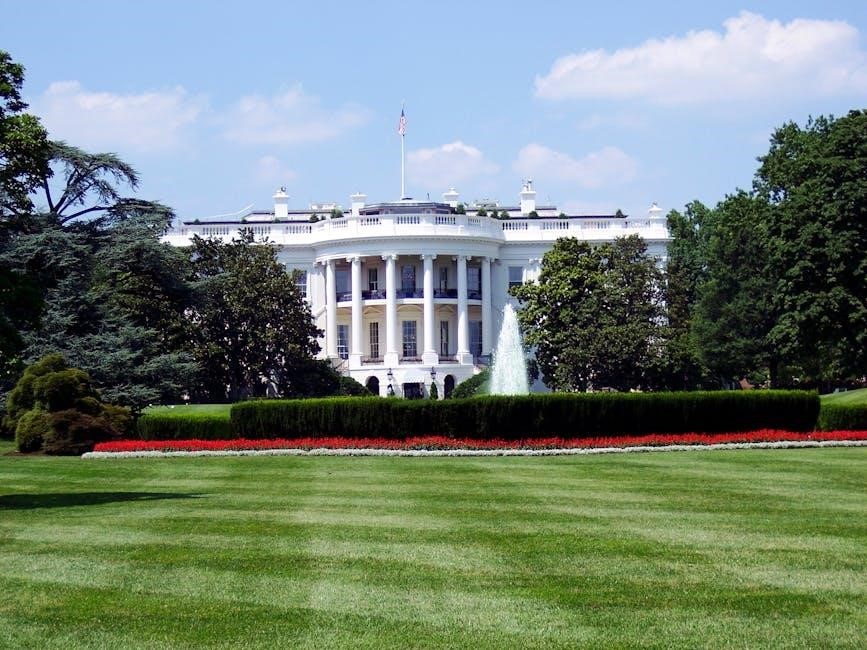Max Weber’s Politics as a Vocation explores the essence of political engagement, emphasizing ethical responsibility and leadership qualities. A foundational text in political sociology, it remains relevant today.
Overview of Max Weber’s Lecture
Delivered in 1919, Max Weber’s Politics as a Vocation examines the nature of political engagement, emphasizing the interplay between power, ethics, and leadership. Weber distinguishes politics from other professions, arguing that it requires a unique blend of passion, responsibility, and moral conviction. He critiques bureaucratic systems and advocates for leaders who balance technical expertise with a sense of purpose. The lecture remains a cornerstone of political theory, offering insights into the challenges of governance and the ethical dilemmas inherent in political life.
Historical Context of the Lecture
Max Weber delivered Politics as a Vocation in 1919, amid post-World War I turmoil in Germany. The nation faced political instability, economic crisis, and social upheaval, shaping Weber’s reflections on leadership and governance. He addressed the challenges of rebuilding society, emphasizing the need for ethical and responsible political engagement. The lecture reflects Weber’s concerns about the rise of bureaucracy and the moral dilemmas faced by leaders in a fractured political landscape, offering timeless insights into the complexities of governance during times of crisis.
Relevance in Modern Political Discourse
Max Weber’s Politics as a Vocation remains highly relevant in contemporary political discourse, offering insights into leadership, ethics, and governance. Current events, such as global trade tensions and political polarization, highlight the ongoing struggle between power and responsibility. Weber’s ideas on ethical decision-making and the role of bureaucracy resonate with modern challenges, such as globalization and technological advancements. His emphasis on moral conviction and accountability continues to inspire discussions on effective leadership in today’s complex political landscape, making his work a timeless guide for understanding political vocation.
Key Concepts in “Politics as a Vocation”
Max Weber’s lecture explores politics as a calling, emphasizing ethical responsibility, leadership qualities, and the balance between power and morality in governance, remaining vital in modern discourse.
Definition of Politics as a Vocation
Max Weber defines politics as a vocation, emphasizing its role as a means to achieve societal goals through responsible power. He highlights the ethical challenges and the necessity of balancing power with morality. Politics, for Weber, is not merely governance but a profound commitment to the public good, requiring dedication and a sense of duty. This perspective underscores the importance of ethical leadership in navigating the complexities of political life, making it a timeless concept in modern discourse.
The Role of Ethics in Politics
Ethics play a central role in politics, as they guide decision-making and ensure accountability. Weber emphasizes that political actions must align with moral principles, balancing power with responsibility. Ethical leadership requires humility and a commitment to the greater good, avoiding personal biases and fears. In today’s political landscape, ethical dilemmas persist, such as trade disputes and policy decisions, highlighting the need for leaders to uphold moral standards. Ethics, therefore, remain a cornerstone of effective and just political governance, shaping both individual and collective outcomes.
The Importance of Responsibility in Leadership
Responsibility is a cornerstone of effective leadership, as emphasized in Weber’s work. Leaders must account for their decisions and their impact on society. Recent political events, such as tariff disputes and public disagreements between figures like Trump and Musk, highlight the need for leaders to act responsibly. Weber’s ideas underscore that true political vocation requires a sense of duty to the public, ensuring actions align with the greater good rather than personal or partisan interests. This principle remains vital in navigating modern governance challenges.

The Political Leader’s Qualities
Political leaders must possess passion, a sense of responsibility, and the ability to make tough decisions, essential for navigating modern governance challenges effectively.
Passion for Politics
Passion for politics is a cornerstone of effective leadership, driving commitment to public service and the pursuit of societal change. It fuels dedication to addressing complex challenges, as seen in leaders like President Trump, whose tariff policies reflect strong convictions. Weber emphasized that genuine political passion stems from a deep sense of responsibility and ethical purpose. This passion enables leaders to inspire and connect with citizens, fostering trust and engagement. Without it, political efforts often lack the energy needed to navigate modern governance and its inherent complexities.
Sense of Responsibility
A sense of responsibility is a critical trait for political leaders, ensuring their actions align with the public’s best interests. Weber argued that true political responsibility involves accountability for decisions and their consequences. This principle is evident in leaders’ policy choices, such as President Trump’s tariff decisions, reflecting a commitment to specific agendas. Responsibility also means balancing power with ethical considerations, as seen in global leaders addressing trade disputes. It underscores the importance of prioritizing long-term societal benefits over short-term gains, fostering trust and stability in governance.
Ability to Make Tough Decisions

The ability to make tough decisions is a hallmark of effective political leadership. Weber emphasized that politicians must navigate complex dilemmas, balancing competing interests and ethical considerations. This skill is evident in leaders like President Trump, who faced criticism for imposing tariffs on key trading partners. Such decisions require weighing short-term economic impacts against long-term strategic goals. The capacity to make unpopular choices, even in the face of public backlash, underscores a leader’s commitment to their vision and the greater good, reflecting Weber’s ideals of political responsibility and resolve.

The Bureaucratic Machine
Weber’s bureaucratic machine highlights the role of structured governance in modern politics, emphasizing efficiency and hierarchy, yet often criticized for its rigidity and detachment from complex public needs.
Weber’s View on Bureaucracy
Max Weber viewed bureaucracy as a rational and efficient system of governance, characterized by clear hierarchies, specialized roles, and rule-based decision-making. He saw it as essential for modern states.
However, Weber also warned of its potential downsides, such as rigid structures, dehumanization, and the concentration of power, which could lead to inefficiencies and disengagement from broader societal needs.
The Role of Bureaucracy in Modern Governance

Bureaucracy plays a central role in modern governance by implementing policies, managing public services, and maintaining administrative order. It ensures efficiency and consistency in decision-making processes.
However, its rigid structures often face criticism for being slow to adapt and disconnected from public needs. Despite this, bureaucracy remains essential for executing complex tasks and upholding legal frameworks in contemporary societies.
Challenges of Bureaucratic Systems
Bureaucratic systems face challenges such as inefficiency, red tape, and resistance to change. They often struggle to adapt to dynamic political landscapes, leading to delays in policy implementation.

Additionally, bureaucratic structures can be influenced by political agendas, undermining their impartiality. This can result in public distrust and calls for reform to enhance transparency and accountability in governance systems.

The Ethical Dilemmas in Politics
Political leaders face ethical dilemmas, balancing power with morality, as seen in decisions like tariffs impacting trade relations and domestic industries, reflecting Weber’s insights.
The Tension Between Ethics and Power
In Politics as a Vocation, Weber highlights the inherent conflict between ethical principles and political power. Leaders often face moral dilemmas, balancing personal convictions with pragmatic decisions. Recent examples, such as President Trump’s tariff policies and public disputes with figures like Elon Musk, illustrate how political power can lead to ethical compromises. The pursuit of agendas, such as trade retaliation or consolidation of authority, often clashes with moral ideals, underscoring Weber’s assertion that political leadership requires navigating this tension effectively to maintain integrity and public trust.
Moral Compromises in Political Decision-Making
Political leaders frequently confront moral compromises, balancing ethical ideals with pragmatic realities. Weber argues that such trade-offs are inevitable in governance. For instance, President Trump’s tariff policies on Mexico, Canada, and China reflect decisions where economic and political goals outweighed ethical considerations. Similarly, public disputes with figures like Elon Musk and Secretary Rubio highlight how political agendas often require sacrificing personal convictions. These examples illustrate Weber’s insight that political effectiveness sometimes demands prioritizing power over strict moral adherence, challenging leaders to reconcile their values with the demands of office.
The Role of Personal Conviction
In Politics as a Vocation, personal conviction emerges as a guiding force for leaders, shaping decisions and actions. Weber emphasizes the importance of steadfast beliefs in navigating complex political landscapes. For instance, President Trump’s unwavering commitment to his agenda, as seen in tariff policies and public disputes with figures like Elon Musk, illustrates how personal conviction can drive policy and public discourse. However, this steadfastness often clashes with ethical considerations, highlighting the tension between conviction and compromise in political leadership.
Case Studies in Political Leadership
Examining leaders like President Trump, whose tariff policies and public disputes with figures like Elon Musk highlight decision-making under Weber’s framework, offers insights into political conviction and conflict.
Historical Examples of Effective Leadership
Leaders like Nelson Mandela exemplify Weber’s ideals, combining passion with a sense of responsibility. His commitment to ethical governance and reconciliation aligns with the vocation’s moral demands. Similarly, figures such as Mahatma Gandhi and Abraham Lincoln demonstrated how political conviction can drive transformative change. These leaders balanced power with ethics, illustrating the tension Weber highlighted between political realism and moral integrity. Their legacies remind us that effective leadership requires both strategic acumen and a steadfast commitment to ethical principles, even in the face of adversity.
Modern-Day Applications of Weber’s Ideas
Contemporary leaders face challenges that resonate with Weber’s principles, such as balancing power and ethics. For instance, President Trump’s tariff policies and interactions with global figures like Xi Jinping reflect the complexities of political decision-making. Weber’s emphasis on responsibility and ethical conviction remains relevant in addressing modern dilemmas, such as globalization and technological advancements. Today’s politicians must navigate these dynamics while upholding moral standards, illustrating the enduring relevance of Weber’s insights in guiding political vocation and leadership.
Lessons from Failed Political Leaders
Failed political leaders often highlight the dangers of prioritizing power over ethical responsibility. For instance, actions like imposing unilateral tariffs or disregarding diplomatic norms can lead to widespread economic and political fallout. Such decisions underscore the importance of accountability and foresight in leadership. Weber’s ideas remind us that true political vocation requires balancing power with moral conviction, a lesson reinforced by the consequences of leadership that neglects these principles. These examples serve as cautionary tales for aspiring leaders, emphasizing the need for ethical grounding in political decision-making.

The Future of Politics as a Vocation

Globalization and technology are reshaping political leadership, demanding leaders who balance power with ethical responsibility. Weber’s insights remain vital for navigating these evolving challenges effectively.
Challenges Facing Modern Politicians
Modern politicians face escalating challenges, including globalization’s economic pressures, technological disruptions, and shifting voter expectations. Balancing power with ethical responsibility remains paramount, as highlighted by Weber. Public scrutiny intensifies due to media and misinformation, while political polarization deepens societal divides. Leaders must navigate complex geopolitical landscapes and address crises like climate change. Additionally, the rise of populist movements and rapid policy demands test traditional governance structures. These challenges require adaptability, moral clarity, and a commitment to serving the public interest amidst growing complexities and uncertainties.
The Impact of Globalization on Political Leadership
Globalization has profoundly reshaped political leadership, fostering interdependence among nations and demanding leaders to address global challenges. The rise of international trade disputes, as seen with tariffs imposed by the U.S. on China, Mexico, and Canada, highlights the complexities of balancing domestic interests with global responsibilities. Leaders must navigate geopolitical tensions, economic interdependencies, and cross-border crises, all while maintaining national sovereignty. This interconnected world requires visionary leadership that can harmonize local priorities with global cooperation, ensuring sustainable and equitable outcomes in an increasingly integrated world.
The Role of Technology in Shaping Political Vocations
Technology has revolutionized political vocations by transforming how leaders engage with citizens and execute governance. Social media platforms enable direct communication, as seen in President Trump’s use of Twitter to shape public discourse. Data analytics and digital tools enhance decision-making, allowing leaders to respond to global challenges like trade disputes and economic shifts. However, technology also introduces risks, such as misinformation and privacy concerns. As political leaders adapt to these changes, they must balance innovation with ethical responsibility to maintain trust and effectiveness in their roles.

Conclusion
Max Weber’s insights on politics as a vocation remain timeless, emphasizing ethical responsibility and leadership. Today, leaders like Trump navigate complex global dynamics, balancing power and morality.
Summary of Key Points
Max Weber’s Politics as a Vocation explores the moral and ethical dimensions of political leadership, emphasizing responsibility, passion, and tough decision-making. It highlights the tension between ethics and power, urging leaders to balance personal conviction with public interest. Weber’s ideas remain relevant in modern discourse, offering insights into the challenges of bureaucracy and the qualities required for effective governance. His work serves as a foundational guide for understanding the complexities of political engagement and the vocation of leadership in both historical and contemporary contexts.
Final Thoughts on Politics as a Vocation
Max Weber’s Politics as a Vocation underscores the enduring relevance of ethical leadership in governance. As seen in current events, such as President Trump’s tariff policies and global political shifts, the balance between power and morality remains a critical challenge. Weber’s insights into responsibility, passion, and decision-making continue to guide modern leaders. His work serves as a timeless reminder that politics, as a vocation, demands both personal conviction and a commitment to the greater good, even amidst the complexities of globalization and technological change.
Call to Action for Aspiring Political Leaders
Aspiring political leaders must embrace their vocation with passion and a sense of duty. In today’s complex world, where globalization and technological advancements reshape governance, Weber’s principles remain vital. Stay informed about global issues, such as trade tensions and political shifts, to make informed decisions. Cultivate ethical responsibility, resilience, and the ability to balance power with morality. Commit to leadership that prioritizes the greater good, even in the face of adversity. The challenges of modern politics demand leaders who embody conviction and integrity, as Weber envisioned.
